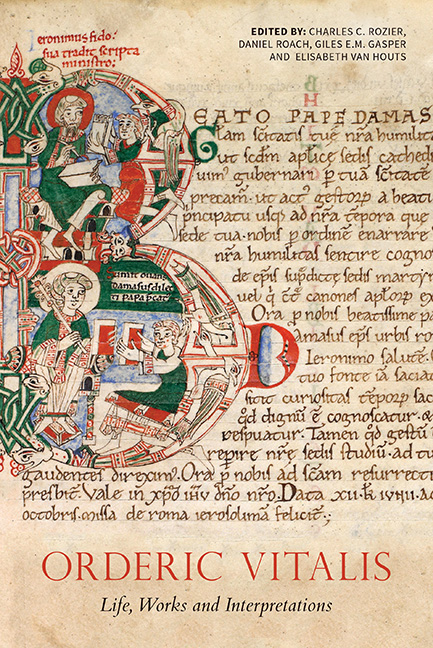Book contents
- Frontmatter
- Dedication
- Contents
- List of Illustrations
- Acknowledgements
- List of Abbreviations
- Chronology of the Lives of Odelerius and his Son Orderic Vitalis
- Composition of the Historia ecclesiastica
- Introduction: Interpreting Orderic Vitalis
- Orderic and his Father, Odelerius
- Following the Master's Lead: The Script of Orderic Vitalis and the Discovery of a New Manuscript (Rouen, BM, 540)
- Orderic Vitalis as Librarian and Cantor of Saint-Évroul
- Saint-Évroul and Southern Italy in Orderic's Historia ecclesiastica
- Orderic and English
- Inscriptions in Orderic's Historia ecclesiastica: A Writing Technique between History and Poetry
- Reading Orderic with Charters in Mind
- Orderic Vitalis and the Cult of Saints
- Orderic's Secular Rulers and Representations of Personality and Power in the Historia ecclesiastica
- Worldly Woe and Heavenly Joy: The Tone of the Historia ecclesiastica
- Orderic Vitalis, Historical Writing and a Theology of Reckoning
- Jesus Christ, a Protagonist of Anglo-Norman History? History and Theology in Orderic Vitalis's Historia ecclesiastica
- ‘Studiosi abdita investigant’: Orderic Vitalis and the Mystical Morals of History
- Meanders, Loops, and Dead Ends: Literary Form and the Common Life in Orderic's Historia ecclesiastica
- Orderic and the Tironensians
- ‘One single letter remained in excess of all his sins …’: Orderic Vitalis and Cultural Memory
- The Reception of Orderic Vitalis in the Later Middle Ages
- Appendix 1 Archaeological Investigations at the Abbey of Saint-Évroult-Notre-Dame-des-Bois
- Appendix 2 Descriptive Catalogue of Manuscripts Featuring the Hand of Orderic Vitalis
- Select Bibliography
- List of Manuscripts Cited
- General Index
Introduction: Interpreting Orderic Vitalis
Published online by Cambridge University Press: 25 October 2017
- Frontmatter
- Dedication
- Contents
- List of Illustrations
- Acknowledgements
- List of Abbreviations
- Chronology of the Lives of Odelerius and his Son Orderic Vitalis
- Composition of the Historia ecclesiastica
- Introduction: Interpreting Orderic Vitalis
- Orderic and his Father, Odelerius
- Following the Master's Lead: The Script of Orderic Vitalis and the Discovery of a New Manuscript (Rouen, BM, 540)
- Orderic Vitalis as Librarian and Cantor of Saint-Évroul
- Saint-Évroul and Southern Italy in Orderic's Historia ecclesiastica
- Orderic and English
- Inscriptions in Orderic's Historia ecclesiastica: A Writing Technique between History and Poetry
- Reading Orderic with Charters in Mind
- Orderic Vitalis and the Cult of Saints
- Orderic's Secular Rulers and Representations of Personality and Power in the Historia ecclesiastica
- Worldly Woe and Heavenly Joy: The Tone of the Historia ecclesiastica
- Orderic Vitalis, Historical Writing and a Theology of Reckoning
- Jesus Christ, a Protagonist of Anglo-Norman History? History and Theology in Orderic Vitalis's Historia ecclesiastica
- ‘Studiosi abdita investigant’: Orderic Vitalis and the Mystical Morals of History
- Meanders, Loops, and Dead Ends: Literary Form and the Common Life in Orderic's Historia ecclesiastica
- Orderic and the Tironensians
- ‘One single letter remained in excess of all his sins …’: Orderic Vitalis and Cultural Memory
- The Reception of Orderic Vitalis in the Later Middle Ages
- Appendix 1 Archaeological Investigations at the Abbey of Saint-Évroult-Notre-Dame-des-Bois
- Appendix 2 Descriptive Catalogue of Manuscripts Featuring the Hand of Orderic Vitalis
- Select Bibliography
- List of Manuscripts Cited
- General Index
Summary
Orderic Vitalis (1075–c. 1142) is predominantly known to modern readers as the author of narrative texts relating to the history of Normandy and the deeds of Norman secular and ecclesiastical personalities at home and abroad, during the period c. 1050–1142. Orderic's two principal works are his interpolated copy of William of Jumièges’ Gesta Normannorum ducum, completed c. 1113, and his own much larger and more ambitious thirteen-book Historia ecclesiastica, completed c. 1141. Together, they provide a wealth of contemporary commentary on some of the most important social, political and ecclesiastical affairs of Orderic's lifetime, as witnessed and interpreted from his home at the monastery of Saint-Évroul in southern Normandy.
The last decades of the eleventh century and the first half of the twelfth witnessed an upsurge of historical writing at a number of intellectual centres throughout England and Normandy. Orderic's historical works should be viewed in the context of this new wave of historiographical enquiry, in which a range of authors sought to rediscover the events of the past and to preserve the memory of their own times for future generations, especially future generations of the communities within which and for which they wrote. Writing in the 1120s, the English author William of Malmesbury reflected on this renewed desire to write history by lamenting the paucity of sources for English history after Bede, and declaring his intention to ‘mend the broken chain of our history’. Across the English Channel in Normandy, Orderic also recognised the need for new historical narratives. Writing in the 1130s, he introduced the first book of the Historia ecclesiastica by stating his ambitions to bring a new energy to the creation and preservation of historical texts:
I set about composing an account of the events which we witness and endure. It is fitting that, since new events take place every day in this world, they should be systematically committed to writing to the glory of God, so that just as past deeds have been handed down by our forebears present happenings should be recorded now and passed on by the men of today for future generations.
- Type
- Chapter
- Information
- Orderic Vitalis: Life, Works and Interpretations , pp. 1 - 16Publisher: Boydell & BrewerPrint publication year: 2016



